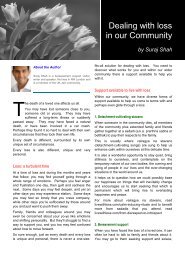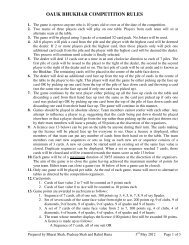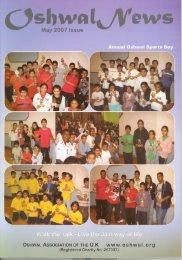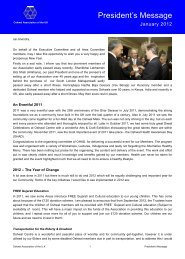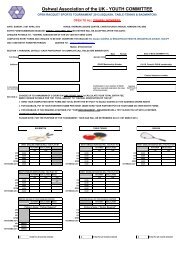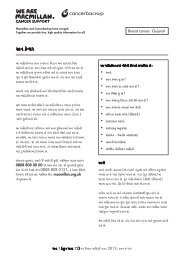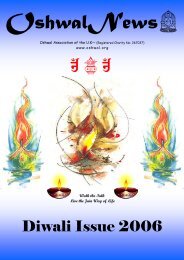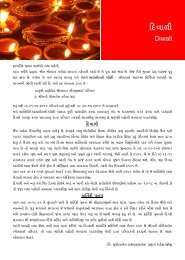Third Edition E-Magazine | April 2013 | www ... - Oshwal Centre
Third Edition E-Magazine | April 2013 | www ... - Oshwal Centre
Third Edition E-Magazine | April 2013 | www ... - Oshwal Centre
Create successful ePaper yourself
Turn your PDF publications into a flip-book with our unique Google optimized e-Paper software.
Modern Food Ethics: How Jainism Helps<br />
By Sagar Kirit Shah<br />
M<br />
embers of the Jain community are familiar with<br />
the idea of using diet to address ethical issues in<br />
food production. From avoiding meat, fish, eggs<br />
and honey, to only drinking boiled water and avoiding<br />
green leafy vegetables during the rainy season – the<br />
traditional Jain diet was pioneered to nourish the human<br />
body while minimising harm to the other living beings we<br />
share the planet with.<br />
Jains living in the West now face an unprecedented<br />
degree of choice when it comes to food. Modern farming<br />
and processing techniques mean that we are able to eat<br />
an incredible range of foods from all over world at any<br />
time of year. This is a wonderful luxury, but is not without<br />
cost. We are now more divorced from food production<br />
than at any other time in human history. Very few of us<br />
know where our food is grown, how it is made, or how it is<br />
transported.<br />
Over past few years, I have spent a considerable amount<br />
of time investigating contemporary issues in the ethics of<br />
food. As adherents of the principle of Ahimsa, I believe<br />
the Jain community should pay great attention to these<br />
issues too.<br />
In this article I shed light on some of the issues I have<br />
uncovered, and offer some tips on how we can reduce<br />
the himsa footprint of our food choices. In particular, I<br />
highlight how some initiatives such as “organic” and<br />
“slaughter-free milk” actually involve much more violence<br />
than first meets the eye. And why several traditional Jain<br />
practices are very useful for<br />
those seeking to reduce the<br />
“himsa” footprint of their diet.<br />
welfare conditions, cows are forcefully made pregnant<br />
through artificial insemination, slaughtered long before<br />
they would naturally leave their bodies, and male calves<br />
born to these cows are killed just days after being born.<br />
The killing of cows on dairy farms is not the only reason<br />
why Jains might wish to reconsider their use of dairy<br />
products. Dairy products are an environmental disaster.<br />
Not only are cows incredibly inefficient at converting what<br />
they eat into human food, they also generate a huge<br />
amount of methane – a gas 25 times more damaging<br />
than carbon dioxide in terms of its impact on global<br />
warming. Just adding a dash of dairy milk to cup of tea<br />
more than doubles its impact on climate change.<br />
A recent study into the environmental impact of various<br />
diets found that removing dairy products from a<br />
vegetarian diet could reduce annual water requirements<br />
by 60% (a saving of 117,000 litres) and could reduce the<br />
carbon impact of the diet by around 75% (a saving of<br />
about 1 tonne of CO2 equivalent a year).<br />
As a response to the treatment of cows in mainstream<br />
dairies, a number of Jains have turned towards using<br />
organic milk and slaughter free milk. The unfortunate<br />
reality is that these products involve unacceptable levels<br />
of violence. Cows on slaughter-free farms are sexually<br />
abused in order to guarantee pregnancy, and cows and<br />
calves on organic farms are still killed long before they<br />
would naturally die. And because cows on organic and<br />
slaughter free farms require more land and produce less<br />
Milk production involves<br />
the killing of cows and is<br />
damaging for the<br />
environment too<br />
While Jain households may<br />
have traditionally looked after<br />
cows like a member of their<br />
family, the treatment of cows on<br />
modern dairy farms now<br />
involves levels violence far<br />
beyond what ancient Jains<br />
considered to be acceptable. In<br />
addition to withstanding terrible<br />
<strong>Oshwal</strong> News E-magazine of the O.A.U.K. 9 <strong>April</strong> <strong>2013</strong> <strong>Edition</strong>





